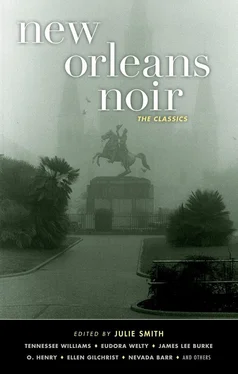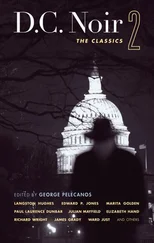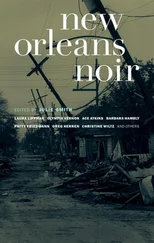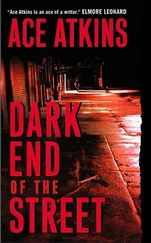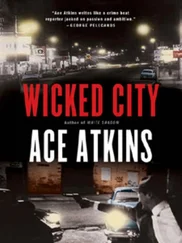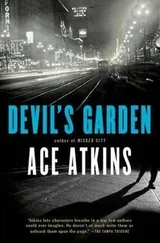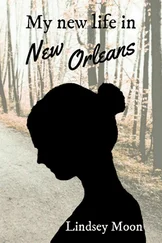Ace Atkins - New Orleans Noir - The Classics
Здесь есть возможность читать онлайн «Ace Atkins - New Orleans Noir - The Classics» весь текст электронной книги совершенно бесплатно (целиком полную версию без сокращений). В некоторых случаях можно слушать аудио, скачать через торрент в формате fb2 и присутствует краткое содержание. Город: New York, Год выпуска: 2016, ISBN: 2016, Издательство: Akashic Books, Жанр: Детектив, на английском языке. Описание произведения, (предисловие) а так же отзывы посетителей доступны на портале библиотеки ЛибКат.
- Название:New Orleans Noir: The Classics
- Автор:
- Издательство:Akashic Books
- Жанр:
- Год:2016
- Город:New York
- ISBN:978-1-61775-384-8
- Рейтинг книги:3 / 5. Голосов: 1
-
Избранное:Добавить в избранное
- Отзывы:
-
Ваша оценка:
- 60
- 1
- 2
- 3
- 4
- 5
New Orleans Noir: The Classics: краткое содержание, описание и аннотация
Предлагаем к чтению аннотацию, описание, краткое содержание или предисловие (зависит от того, что написал сам автор книги «New Orleans Noir: The Classics»). Если вы не нашли необходимую информацию о книге — напишите в комментариях, мы постараемся отыскать её.
takes a literary tour through some of the darkest writing in New Orleans history.
New Orleans Noir: The Classics — читать онлайн бесплатно полную книгу (весь текст) целиком
Ниже представлен текст книги, разбитый по страницам. Система сохранения места последней прочитанной страницы, позволяет с удобством читать онлайн бесплатно книгу «New Orleans Noir: The Classics», без необходимости каждый раз заново искать на чём Вы остановились. Поставьте закладку, и сможете в любой момент перейти на страницу, на которой закончили чтение.
Интервал:
Закладка:
Chris didn’t send word to us. It was almost like he forgot. There was one letter from a friend of his in Japan, saying that he had seen him in a hospital there and that the nurses were a swell set of people and so were the doctors.
Lena left the letter open on the table for us all to see. That night she picked it up and put it in the drawer of her dresser with the yellow paper of the telegram.
And there wasn’t anything else to do but wait.
No, there were two things, two things that Lena could do. The day after the telegram came, she asked me to come with her.
“Where?”
“St. Michel’s.” She was drying the dishes, putting them away in the cupboard, so I couldn’t see her face, but I could tell from her voice how important this was.
“Sure,” I said. “Sure, I’ll come. Right away.”
St. Michel’s was a small church. I’d counted the pews once: there were just exactly twenty; and the side aisles were so narrow two people could hardly pass. The confessional was a single little recess on the right side in the back, behind the baptismal font. There was a light burning — Father Graziano would be back there.
“You wait for me,” Lena said. And I sat down in the last pew while she walked over toward the light. I kept my head turned so that she wouldn’t think I was watching her as she went up to the confessional and knocked very softly on the wood frame. Father Graziano stuck his gray old head out between the dark curtains. I didn’t have to listen; I knew what Lena was asking him. She was asking him to pray for Chris. It only took her a minute; then she walked quickly up to the front, by the altar rail. I could hear her heels against the bare boards, each one a little explosion. There were three or four candles burning already. She lit another one — I saw the circle of light get bigger as she put hers on the black iron rack.
“Let’s go,” she said. “Let’s go.”
Father Graziano had come out of the confessional and was standing watching us. He was a small man, but heavy, with a big square head and a thick neck. He must have been a powerful man when he was young. Chris had a neck like that, muscled like that.
For a minute I thought he was going to come over and talk to us. He took one step, then stopped and rubbed his hand through his curly gray hair.
Lena didn’t say anything until we reached the corner where we turned to go home. Without thinking, I turned.
“Not that way.” She caught hold of my arm. “This way here.” She went in the opposite direction.
I walked along with her, trying to see her face. But it was too dark and she had pulled the scarf high over her head.
“We got to go to Maam’s,” she said and her voice was muffled in the collar of her coat.
“To what?” not believing I’d heard her right.
“To Maam’s.”
Maam was a grisgris woman, so old nobody could remember when she’d been young or middle-aged even. Old as the river and wrinkled like it too, when the wind blows across.
She had a house on the batture , behind a clump of old thick hackberries. There was the story I’d heard: she had wanted a new house after a high water on the river had carried her old one away. (All this was fifty years ago, maybe.) So she’d walked down the levee to the nearest house, which was nearly a mile away: people didn’t want to live close to her. She’d stood outside, looking out at the river and calling out: “I want a house. A fine new house. A nice new house. For me.” She didn’t say anything else, just turned and walked away. But the people inside had heard her and spread the word. Before they even began to fix the damage the flood had done to their own houses, the men worked on her house. In less than a week it was finished. They picked up their tools and left, and the next day they sent a kid down to spy and, sure enough, there was smoke coming out of the chimney. Maam had moved in: she must have been watching from somewhere close. Nobody knew where she had spent the week that she didn’t have a house. And everybody was really too scared to find out.
She was still living in that house. It was built on good big solid pilings so that floodwaters didn’t touch it. I’d seen it once; Pete had taken me up on the levee there and pointed it out: a two-room house that the air and the river damp had turned black, on top a flat tin roof that shone in the sun. At the beginning of the dirt path that led down to the house I saw a little pile of food people had left for her: some white pieces of slab bacon, some tin cans. Pete wouldn’t let me get close. “No sense fooling with things you don’t understand,” he said.
Maam didn’t leave her house often. But when she did, when she came walking down the streets or along the levee, people got out of her way. Either they slipped down into the batture bushes and waited until she passed by on the top of the levee, or, in town, they got off the banquette and into the street when she came by — an old woman with black skin that was nearly gray and eyes hidden in the folds of wrinkles, an old woman wearing a black dress, and a red shawl over her head and shoulders, a bright red shawl with silver and black signs sewed onto it. And always she’d be staring at the girls; what she liked best was to be able to touch them, on the arm or the hand, or catch hold of a little piece of their clothes. That didn’t happen often, everybody was so careful of her.
And still Lena had said: “We going to Maam’s.”
“Lord,” I said, “why?”
“For Chris.”
There wasn’t anything I could answer to that.
It was still early, seven thirty or eight, but nights don’t seem to have time. The moon wasn’t up yet; the sky was clear, with hard flecks of stars. Out on the river one ship was moving out — slipping between the riding lights of the other anchored ships that were waiting their turn at the docks below the point. You could hear the steady sound of the engines.
On top of the levee the river wind was strong and cold and heavy-wet. I shivered even with a coat and scarf. There was a heavy frost like mold on the riverside slant of the levee. I stopped and pulled a clover and touched it to my lips and felt the sting of ice.
There was a light in Maam’s house. We saw that as we came down the narrow little path through the hackberry bushes, the way that Pete wouldn’t let me go when I was little. She must have heard us coming — walking is noisy on a quiet night — because without our knocking Maam opened the door.
I never did see her face. She had the red scarf tied high around her head so that it stuck out far on the sides. She mightn’t have had a face, for all I could tell. The house was warm, very warm; I could feel the heat rush out all around her. She was wearing a black dress without sleeves, of some light material with a sheen like satin. She had tied a green cord tight around her middle. Under it her stomach stuck out like a pregnant woman’s.
“I came to fetch something,” Lena said. Her voice was tight and hard.
Inside the house a round spot was shining on the far wall. I stared at it hard: a tray, a round tin tray, nailed to the wall. I couldn’t see more than that because there wasn’t much light; just a single kerosene lamp standing in the middle of the room, on the floor. Being low like that, it made the shadows go upward on the walls so that even familiar things looked strange.
“I came to fetch something,” Lena said. “For somebody that’s sick.”
Maam didn’t move.
“To make him well,” Lena added.
Maam turned around, made a circle back through her cabin, ending up behind her half-open door, where we couldn’t see. I suppose we could have stepped inside and watched her — but we didn’t. And in a couple of seconds she was back at the doorway. She was holding both arms straight down against her sides, the hands clenched. And she kept looking from Lena to me and back again.
Читать дальшеИнтервал:
Закладка:
Похожие книги на «New Orleans Noir: The Classics»
Представляем Вашему вниманию похожие книги на «New Orleans Noir: The Classics» списком для выбора. Мы отобрали схожую по названию и смыслу литературу в надежде предоставить читателям больше вариантов отыскать новые, интересные, ещё непрочитанные произведения.
Обсуждение, отзывы о книге «New Orleans Noir: The Classics» и просто собственные мнения читателей. Оставьте ваши комментарии, напишите, что Вы думаете о произведении, его смысле или главных героях. Укажите что конкретно понравилось, а что нет, и почему Вы так считаете.
